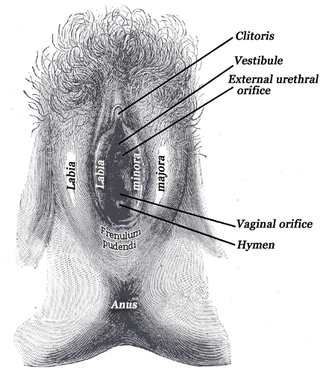Hymen
membrane that surrounds or partially covers the external vaginal opening From Wikipedia, the free encyclopedia
The hymen (also called maidenhead) is tissue that surrounds or partially covers the external vaginal opening. The hymen has no known use. People used to believe that the hymen always tears after having sexual intercourse for the first time, and that you could tell if a woman was a virgin by looking at her hymen and seeing if it was torn. However, it turns out that it is impossible to tell if someone is a virgin by looking at their hymen.[1] Studies have confirmed that all girls are born with hymens.[2]
This article needs more sources for reliability. |
Types
There are several different types of hymen. In about 1 in 2,000 females, the hymen does not develop at all.[3] The hymen may also not have a hole in it; this is called an "imperforate hymen". In this case a hole will need to be surgically cut into it to allow menstrual fluid (period blood) out.[4] Other types are:
- crescent-shaped
- forming a ring around the vagina
- folding in on itself
- has one or more bands going across the opening
- has several holes
What might damage the hymen
When a girl reaches puberty, the hymen becomes stretchy. The hymen may be damaged by girls fall directly onto sharp objects .[5] Sexual intercourse is another easy way to damage the hymen along with horseback riding and biking. A woman's hymen can also break while playing some sports
Hymens in other animals
These animals all have a hymen:
There are many more animals which have hymens, but not all are listed here.
The stages of growth
When a fetus is developing, there is no vaginal opening. The hymen comes from the skin covering the vagina at that time.[6]
In young babies, the hymen is thick and pink. This is because the mother is giving the baby hormones through breast feeding which keeps it thick. In adolescent girls, the hymen becomes thin, smooth and delicate because she has stopped taking in hormones. The hymen becomes very sensitive and can easily cause pain if touched. From puberty, the hymen gets thicker again and becomes pale pink. This is because of the hormone estrogen.
Gallery, references


Wikimedia Commons has media related to Hymen.
Wikimedia Commons has media related to Human vagina.
References
Other websites
Wikiwand - on
Seamless Wikipedia browsing. On steroids.

